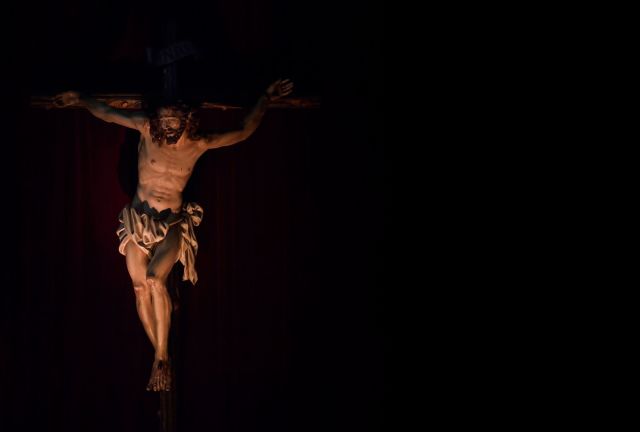Credit: Getty

Pascal’s Wager famously argues a rational case for belief.
Given that we cannot know whether God exists, he argues, it is better to believe than not to believe. For to believe costs us very little, but offers the possibility of eternal life. Not to believe, however, risks eternal damnation. So, given we cannot know which position is true, we might as well believe – the upside to belief is so much more attractive than the downside to unbelief: heads you win, tails nothing lost.
I don’t know anyone who has actually been convinced by this argument. Nonetheless, it remains one of the most celebrated philosophical arguments for belief – and has been credited as one of the earliest examples of probability theory.
For a sustained take-down of Pascal’s position, pick up the work of the financial-markets-trader-turned-public-philosopher Nassim Nicholas Taleb. He’s a Greek orthodox Christian by background, and someone who understands belief – and probability – far better than Pascal himself.
As he sees it, there are two fundamental problems with Pascal’s Wager. First, as he puts it in his little book of aphorisms, The Bed of Procrustes: “Those who think religion is about ‘belief’ don’t understand religion, and don’t understand belief.” And, second, because, without what he calls, as per the title of his most recent book, Skin in the Game, a wager such as Pascal’s is morally vacuous.
As anyone seriously embarking on the season of Lent will know, the Christian injunction to believe is framed in terms of the instruction to share in the suffering of the cross. “Whoever wants to be my disciple must deny themselves and take up their cross daily and follow me”[1. Luke: 9.23]. “Belief”, then, is hardly the cost-free option that Pascal proposes. Indeed, as Taleb rightly suggests, to call this a “belief” – that is, a question of epistemology – seriously misunderstands the basis of Christian discipleship.
“Follow me” is the instruction. It is not an intellectual exercise. And it promises suffering and death, as well as eternal life. Pascal is wrong all ways round. So Taleb, as I read him, is as much a theologian as he is a philosopher of risk. What is so interesting, is the connections he makes between the two.
Taleb directs much ire towards those who take risks with other people’s lives or with other people’s money. Those people who, generally, sit in air-controlled offices, in the White House or the New York Times, arguing, for instance, for the invasion of Iraq, when they themselves will suffer no consequences for the course of action they propose. Other people will die for their mistakes, though.
Likewise, Taleb excoriates those in the financial markets who trade with other people’s money, making huge profits if they succeed, and being bailed out by the tax payer if they fail. That, of course, was what happened in the financial crash of 2008. It showed that for those banks that were ‘too big to fail’, profits were privatised and losses were socialised. The villain of Taleb’s story is Bob Rubin, a man who received $120 million in compensation from Citigroup before the crash, and yet, when the bank was made insolvent, suffered absolutely no consequence for the decisions he made that led to the company’s downfall. Rubin had no skin in the game.
In Taleb’s story, no one should be too big to fail – not even God. And that, he reflects, is precisely the point of the incarnation. God becomes human to have skin in the game, quite literally. Incarnation – like chilli con carne – refers to meat; to the becoming flesh (carne) of the divine. And this means that even God is not separated from the consequences of his/her actions.
“The main flaw in Pascal’s wager,” writes Taleb, “is that belief cannot be a free option. It entails symmetry between what you pay and what you receive. So the skin-in-the-game rules that hold between humans also hold in our rapport with the gods.” The gods do not like cheap talk. And Pascal’s “belief” is cheap talk. As Taleb concludes: “Love without sacrifice is like theft (Procrustes). This applies to any form of love, particularly the love of God.”
I can think of no better reflection for the beginning of Lent. Following Christ is not some academic “belief”, it is having skin in the game.
A god that is invincible, beyond pain and death, is not a god worth believing in. The philosopher Martha Nussbaum, in a brilliant essay called Love’s Knowledge, writes about why Odysseus rightly rejects the advances of the goddess Calypso. Calypso falls for the heroic Odysseus and offers him infinite security on her island of perfect bliss. But he politely rejects her offer, preferring to set sail on the risky ocean to be reunited with his mortal love, Penelope.
Why, in ancient Greek literature, do the gods so often fall in love with human beings, Nussbaum asks. Because human beings can do things that the immortals cannot – they can suffer and die; not least, they can demonstrate love through risk for others, through self-sacrifice. “Greater love has no one than this,” as St John puts it[2. John 15:13], “that they lay down their life for their friends.”
What content can be given to divine courage if the gods are incapable of risking their very existence. Little wonder, then, that gods find human existence more attractive than that made possible by the Olympian security of their own kind. This is the reason, in Christian theology, that God becomes human in the person of Jesus Christ. And so subject to the power of death. Love. Skin in the game.










Join the discussion
Join like minded readers that support our journalism by becoming a paid subscriber
To join the discussion in the comments, become a paid subscriber.
Join like minded readers that support our journalism, read unlimited articles and enjoy other subscriber-only benefits.
Subscribe